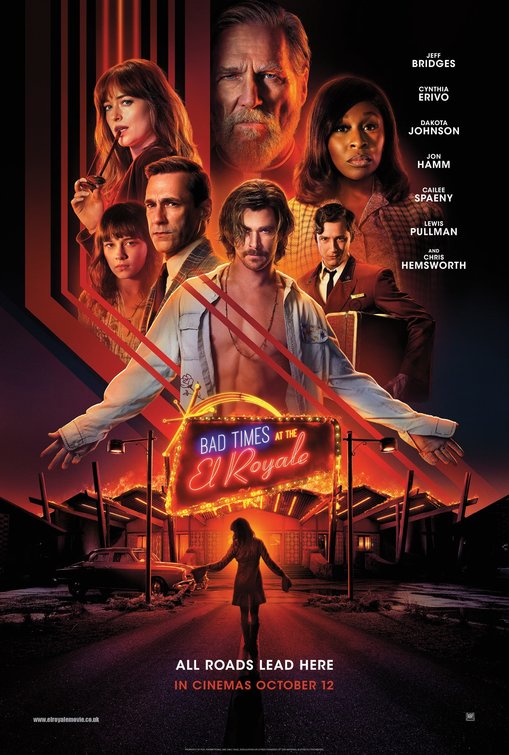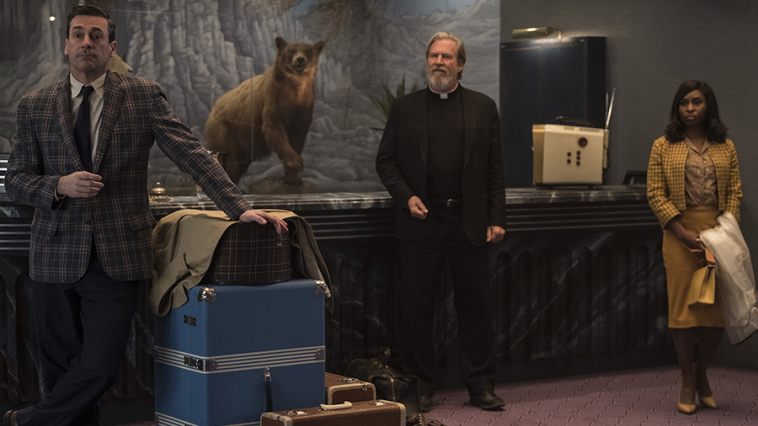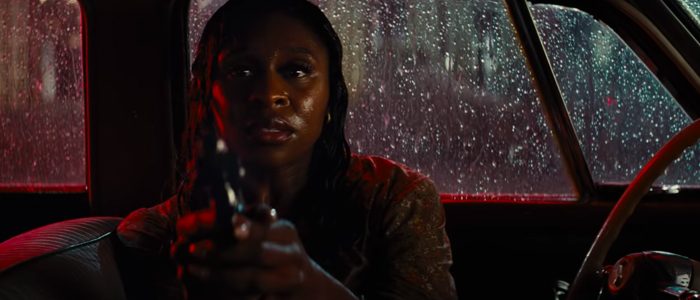by Chris Feil
 Drew Goddard has become a Hollywood go-to screenwriters for charging genres with new life, molding The Martian with equal parts brainy science and dopiness and both upholding and subverting the monster movie with Cloverfield. Bad Times at the El Royale is his first return to the director’s chair since the horror spoof-but-also-not-a-spoof The Cabin in The Woods, and again he has perhaps bitten off more than he can narratively chew.
Drew Goddard has become a Hollywood go-to screenwriters for charging genres with new life, molding The Martian with equal parts brainy science and dopiness and both upholding and subverting the monster movie with Cloverfield. Bad Times at the El Royale is his first return to the director’s chair since the horror spoof-but-also-not-a-spoof The Cabin in The Woods, and again he has perhaps bitten off more than he can narratively chew.
This time Goddard is taking on pulpy pop noir, setting for a showdown at a highway hotel bisected by the California-Nevada border. Checking in are Cynthia Erivo’s quiet lounge singer Darlene, Jon Hamm’s chatterbox vacuum salesman Laramie Sullivan, Dakota Johnson as a mysterious woman named Emily, and Jeff Bridges giving the most Bridges as a suspicious priest named Father Flynn. The writer/director has Tarantino on the brain as Agatha Christie, chaptering the film by the various rooms hosting each guest and slowing revealing the night’s dirty deeds from each of their perspectives. Think of it like a heterosexual Clue mixed with a bisexual Reservoir Dogs, but not as fun.

But El Royale has one too many reference points, becoming bloated but airless, pleasing to look at but out of reach from the plentiful 60s themes it tries to incorporate. Key on its mind are surveillance and identities lost to a cause, keen themes to make for some classic noir that ultimately never really amount to much more than window dressing. Its most inventive narrative sparks also go frustratingly undeveloped: the legalities of the border-hugging locale, the sinister watching eyes of government agencies, and the Manson-esque cult led by a clothes-allergic Chris Hemsworth. It’s both off-road and a dead end.
The film is rather unevenly paced, with each new chapter stalling the film rather than intensifying it. Its most exciting element is the gorgeous period pizazz of Martin Whist’s production design, creating a fancy-chintz world like a mean older sibling of his work on Down With Love. Though Goddard does graft the film with some nifty and moody long takes, the film becomes lethargic with reams of aimless dialogue and stakes that are glacial in revealing themselves. When the film does click into its concept, it hums with entertaining paranoia and a clear vision. Cinematographer Seamus McGarvey offers some saturated sumptuousness to amp up the tension and popcorn sleeze. But by the time Hemsworth’s ab janglin’ evil spiritual leader shows up to dole out punishment before a most lethargic third act, even the pastiche is can’t keep us all that enthused.

Though at least the film has the spiritual sense to know that Erivo’s vocals are its greatest set piece, allowing her to belt out at least a dozen familiar hits of the era. After a fledgling career in a music industry of disappointments and Xavier Dolan sneering at her (nope, I’m not kidding), she knows when to keep her head down to make it through tough situations. Her Darlene is as underwritten as the rest of the characters, but Erivo’s understated presence (also richly on display in the upcoming Widows) remains a bright spot that the film sorely needs. And she’s about the only cast member that the film knows what to do with.
Goddard has made something watchable and occasionally fun, but quite patience-testing as it stumbles to capitalize on its obvious assets. Its surface offers much detail to be wrought, but once it becomes stale we are only left with its uninvolving structure that it only mildly adheres to and offers few rewards. This time the genre escape is like something that took all the wrong lessons from Pulp Fiction, making for Goddard’s most anonymous work unfortunately.
Grade: C